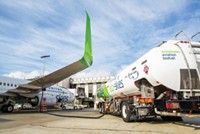Advertisement
Grab your lab coat. Let's get started
Welcome!
Welcome!
Create an account below to get 6 C&EN articles per month, receive newsletters and more - all free.
It seems this is your first time logging in online. Please enter the following information to continue.
As an ACS member you automatically get access to this site. All we need is few more details to create your reading experience.
Not you? Sign in with a different account.
Not you? Sign in with a different account.
ERROR 1
ERROR 1
ERROR 2
ERROR 2
ERROR 2
ERROR 2
ERROR 2
Password and Confirm password must match.
If you have an ACS member number, please enter it here so we can link this account to your membership. (optional)
ERROR 2
ACS values your privacy. By submitting your information, you are gaining access to C&EN and subscribing to our weekly newsletter. We use the information you provide to make your reading experience better, and we will never sell your data to third party members.
Business
ConocoPhillips and Tyson Will Make Fuel From Fat
Industrial giants join to produce renewable diesel fuel from beef, pork, and poultry fat
by Glenn Hess
April 19, 2007
Oil major ConocoPhillips and meat processor Tyson Foods are joining forces to create and market a new type of transportation fuel made from beef, pork, and poultry fat. They say it will supplement the existing petroleum-based diesel fuel supply.
The companies plan to combine Tyson's knowledge of protein chemistry and production with ConocoPhillips' processing and marketing expertise to introduce a renewable fuel that meets all federal standards for ultra-low-sulfur diesel.
"This alliance will provide a new and significant contribution to our nation's domestic renewable fuel supply," says ConocoPhillips CEO James J. Mulva. "It also offers an excellent opportunity to use our company's manufacturing expertise and advanced technology to help increase the supply of renewable fuels and to reduce greenhouse gas emissions."
Tyson CEO Richard L. Bond calls the partnership "a big win for the entire agricultural sector" because it paves the way for greater involvement of fats and oils in renewable fuels.
Officials say Tyson will begin preprocessing animal fat from some of its North American rendering facilities later in the year. ConocoPhillips will begin the necessary capital expenditures to enable it to produce the fuel in several of its refineries.
Production of renewable diesel, which is scheduled to start in the fourth quarter of 2007, is expected to reach as much as 175 million gal annually within a few years.
The production technology, which ConocoPhillips developed at its Whitegate refinery in Cork, Ireland, uses a thermal depolymerization technique to coprocess animal fat with hydrocarbon feedstock.
ConocoPhillips and Tyson say their fuel is chemically equivalent to the diesel produced from hydrocarbon feedstocks and can be transported directly through existing pipelines to distribution terminals. The latter trait, they say, sets it apart from biodiesel, which in the U.S. is mostly derived from soybean oil and must be transported by truck or rail.





Join the conversation
Contact the reporter
Submit a Letter to the Editor for publication
Engage with us on Twitter